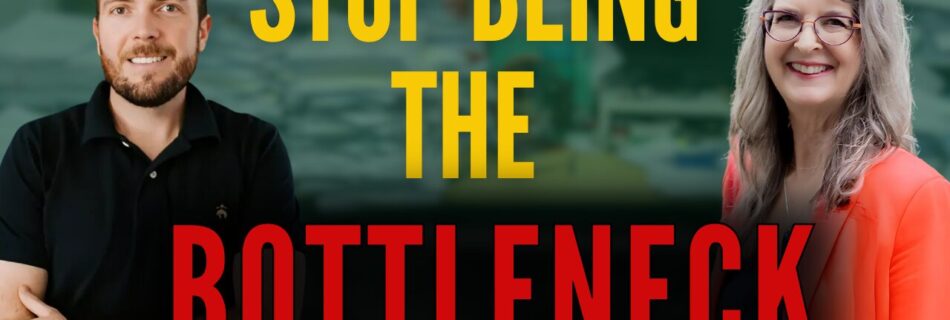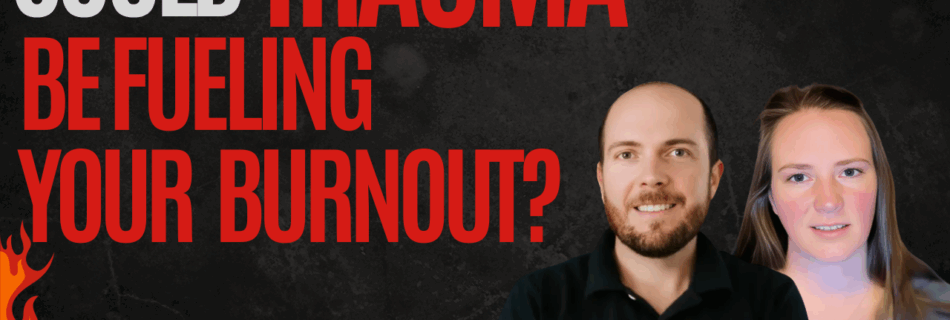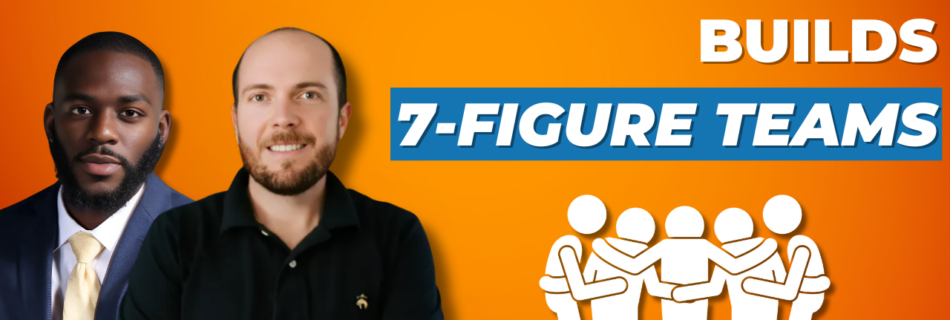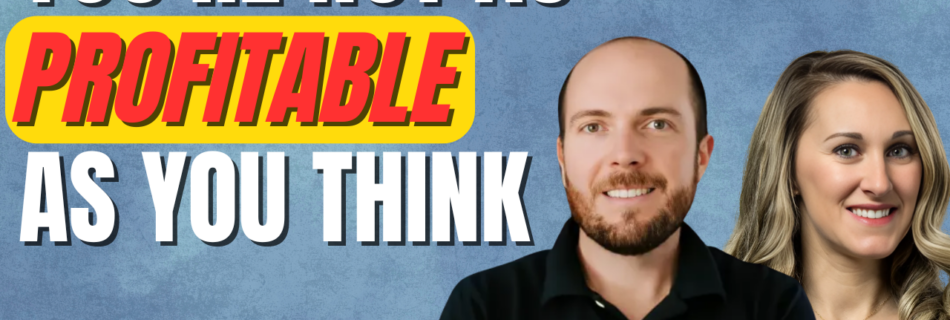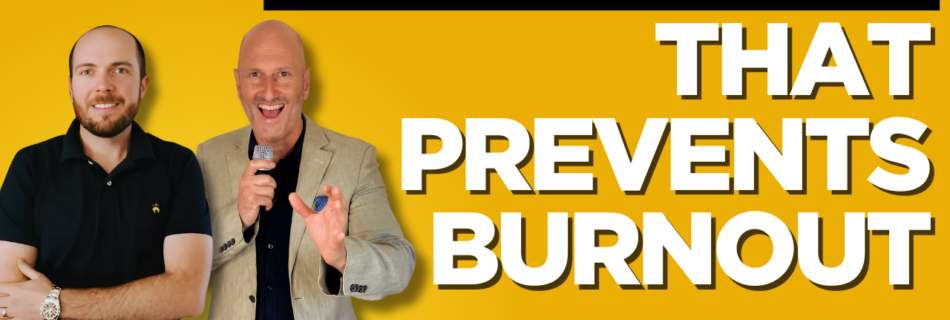Marketing Without Strategy Is Costing You More Than You Think
If you’re a small business leader juggling roles and drowning in “random acts of marketing,” this one’s for you. In our latest episode of Scale Smart, Grow Fast, Harley Green sat down with Sara Nay, CEO of Duct Tape Marketing, to talk about why marketing strategy must come before tactics and technology—especially AI.
Preferred listening on the go? Catch the full podcast episode on Spotify and Apple Podcasts.
🎯 Why Most Marketing Fails Small Business Owners
Many founders approach marketing with a to-do list: “We need a new website, some paid ads, maybe some SEO.” But as Sara shares, without a clear strategy, you risk spending thousands with little return—and a lot of frustration.
Her team often steps into companies spending $10K+ monthly on marketing with no idea what’s working. Sound familiar?
🧭 What Strategic Marketing Actually Looks Like
Sara breaks down a proven process that includes:
- A marketing and brand audit
- Ideal client interviews
- Competitive research
- Messaging development
- Customer journey mapping
- A focused execution calendar
This foundational work brings clarity, confidence, and control—and often helps businesses do less with better results.
🤖 Don’t Just “Do AI” — Train It on Strategy
With AI tools like ChatGPT trending, Sara warns against adopting them without intention. Instead:
- Align business and marketing goals.
- Identify your team’s gaps.
- Choose AI tools based on specific objectives.
- Train AI with your brand voice, values, and strategy.
Smart AI integration enhances your marketing—it doesn’t replace strategy.
🧠 From Doers to Managers: Elevating Your Marketing Team
Sara also emphasizes helping teams evolve by:
- Auditing their roles
- Identifying tasks AI can support
- Upskilling them into strategy-focused roles
Bringing in a fractional CMO (like Duct Tape Marketing offers) can help founders stay in their zone of genius while giving their team the guidance and structure to succeed.
🚀 Take Action: Start with Strategy
If you’re scaling a business and overwhelmed with marketing decisions, here’s Sara’s advice:
“Don’t rush into AI or shiny tools. Start with your business goals, then build a marketing strategy that supports them. Everything else should flow from there.”
🔗 Resources from Sara Nay:
• Duct Tape Marketing
• The Unchained Model
• Connect with Sara on LinkedIn
⏳ Ready to Focus on Growth, Not the Grind?
Schedule a free discovery call to see how an ultimate executive assistant from Workergenix can free up your time to focus on what really drives growth.
Like what you read? Get weekly insights on scaling, efficiency, and profitability—straight to your inbox. Click here to subscribe.Transcript
Harley Green: Hey everybody. Welcome back to the Scale Smart, Grow Fast podcast. Now in today’s fast-paced business world, growth without intention leads to exhaustion and missed opportunities. In this episode, Sara Nay, CEO of Duct Tape Marketing, shares how leaders can scale strategically by aligning their marketing efforts, leveraging AI, and building a team that thrives. With over a decade of experience advising thousands of business owners, Sara offers a grounded, actionable approach to sustainable growth that protects your energy and maximizes your impact.
So thank you for being on the podcast today. How are you doing?
Sara Nay: I’m doing well. Thank you for having me on. Excited to be here.
Harley Green: Tell us a little bit more about your background. What brought you to Duct Tape Marketing in this role of helping other people with their marketing?
Sara Nay: Duct Tape Marketing as a business has been around for about 30 years. I actually joined the team back in December 2010 as an intern. I had graduated college, done some traveling, was a ski bum and went to South America for a while, four months or so, and came back and didn’t really know what I was going to pursue. So I started honestly as an intern saying, “Marketing sounds interesting. Let’s see where this goes.” Obviously, it stuck. I’ve been around for about 15 years now in the company. Even though I started as an intern back in the day, I’ve moved throughout the company through multiple different roles. I was community manager for a while, account manager. I served as fractional CMO to our clients for a while, COO, sales. Most recently, last year, I moved into the seat as CEO. I’ve been involved in all the different areas of a marketing agency at this point and have learned a lot along the way.
Harley Green: I can imagine. That is quite the journey and I think it speaks to a great business if it’s able to keep someone as talented as you there that long and have all this experience. That’s really impressive.
Sara Nay: Thank you. I caught the bug. Our founder, John Jantsch, is really passionate about serving small businesses. So back when he started Duct Tape Marketing, he saw that marketing was really complicated and confusing for small businesses to buy because they just really didn’t even know what they were buying in a lot of cases. So he set out on a mission to make marketing as simple and practical to the small business space as possible. I’ve really been passionate about that myself now over the years. As I said, I’ve been in the sales role for a while and I’ve seen so many small businesses come to us frustrated that marketing doesn’t work. They’ve tried to hire different agencies. They’re spending all this money. They’re getting complicated reports with no actual customers and all that stuff. So I’ve heard all of these stories myself. I’ve also then walked through taking someone from frustrated with marketing to then creating a strategy, to them understanding the what and the why behind the things they’re doing. I’ve seen that transformation. So that’s caused me to become very driven and passionate to help those small businesses as well.
Harley Green: I think you really are speaking to a lot of the pain points people feel with marketing there. What are some of the examples of strategies that you employ that help marketing stay simple and still impactful?
Sara Nay: A lot of times people will come to marketing companies and they’ll say something like, “I need a new website” or “I need to launch paid ads” or “I need tactics,” essentially. What we’ve always said is strategy needs to come before any tactics. Now we’re even shifting to say strategy needs to come before tactics and technology, because now people are diving into AI without the proper strategy in place. Marketing strategy has so many definitions. We usually work with clients in an initial 30 to 45-day engagement where we are doing things like a marketing and brand audit to get a baseline of their marketing and brand today. We’re interviewing some of their best clients. We are doing competitive research to ultimately develop ideal client profiles or personas and then core messaging. Step one and two of marketing is you need to understand who you’re talking to and what message resonates with them. Then we move more into the planning phase of strategy, which is mapping out the customer journey, mapping out a content strategy, identifying the four to six biggest growth priorities over the next quarter, and putting that all into an execution calendar. A lot of times when I talk to businesses, they’re like, “Yeah, I have a marketing strategy,” and they have a list of tactics. Like, “We’re going to do this, this and this.” That’s a piece of marketing strategy. It’s an important piece, but you need all of the stuff that goes on the front end. If you’re telling me you need to be focused on Meta ads, but your clients aren’t on Facebook, it probably doesn’t make sense. Also, you need to understand what messaging actually resonates with them as well. That’s where I see a lot of people waste money on marketing. They’re just on these channels spending. They don’t have any idea if it’s working or not, but they haven’t put the work in on the front end. A lot of times when you go through creating a marketing strategy, you can actually simplify what you’re doing from a marketing perspective and focus on the right channels with the right message at the right time to your ideal clients.
Harley Green: What are some of the biggest surprises people you’ve worked with have had as they’re going through this process and having this strategy developed, whether it’s finding details about that ideal client or what technologies or platforms they should be using? I’m curious, what are some of those aha moments they’ve had when working with you?
Sara Nay: It’s maybe less “aha moments” and more so clarity is what they’re getting. A lot of small businesses out there are just spending money on marketing. Then I ask them, “Are these channels working for you? Are you hitting specific goals? What are you tracking? Should you keep doing these things?” A lot of times they don’t know. I can’t tell you how many times I’ve started working with a small business when we back up and do strategy, and maybe they’re spending $10,000–$15,000 a month across all of these different channels. When I ask them why, they say, “Because we’ve always done it and we don’t know what’s working and we need to be on these things.” It’s not always ah-has, it’s more about putting clarity behind the why. Analyzing and actually getting metrics and tracking set up. Then understanding what’s working and shifting the budget towards that versus being spread thin across all the channels. So it’s really more of a clarity, confidence, and control thing than anything.
Harley Green: One thing you mentioned is having that strategy before technology, especially with AI coming in and everyone being like, someone said I should use AI in marketing. What kind of advice do you have for people when it comes to making those marketing decisions and staying focused when there are shiny tools everywhere?
Sara Nay: We have a process that I think makes sense for that. A lot of small businesses right now are bringing in AI solutions like ChatGPT. Everyone on their team is doing it differently. There’s no consistency, there’s no proper training for the AI or for the team on how to use it effectively. There are no systems and processes in place. All of a sudden, these teams are confused and creating noise. It’s really important to take a step back. Just like bringing in technology and tools without a reason complicates things. We often say: take a step back, understand the business strategy. What’s the business trying to accomplish? Then map the marketing strategy from there, then analyze your team strategy. Then you can start to say, okay, if these are our specific goals and priorities for the next quarter, here’s who we have in place already as humans. What AI systems can we layer below them? Then you’re bringing in AI to accomplish a specific goal versus just bringing in AI for the sake of it. Once you’ve identified the right tool, say ChatGPT for content repurposing, then you need to train AI on your business—your vision, mission, values, ideal clients, your messaging, how you want to be seen in the world. You give AI that context so when it starts creating or helping with repurposing, it’s on-brand. Your tone of voice matches. You create the strategy, train AI on it, and then have systems in place so your team uses AI consistently rather than everyone doing their own thing.
Harley Green: So having that strategy upfront actually makes it easier to leverage these tools then, because you’re able to take that information that you’ve already developed, feed it into tools like AI, and get much better outputs.
Sara Nay: Yes, and you can even use something like ChatGPT to help with strategy creation on the front end. The important thing is that you’re giving AI the context on your business. I see a lot of stuff on LinkedIn or different platforms where it’s clearly AI-created and generic. That’s a problem when businesses use AI without direction. But if you give AI the context of your business, your viewpoints, values, stories—then it can help you create content that still tells your story. One of our favorite uses of AI is to create a video on a topic you want to be known for, then feed that into AI to repurpose it into different formats. It’s still coming from you. AI just helps you turn that video into emails, blog posts, social posts, and all the things. You’re getting more bang for your time spent, but the core is still you, not generic AI filler.
Harley Green: Great advice. You talked earlier about the business goals and strategy and aligning those things. Where do you see most businesses getting stuck when trying to align marketing with business goals?
Sara Nay: Unfortunately, too many businesses think of them as separate things. They think, we have business objectives and goals over here, and marketing is over there. It’s all siloed. We have a marketing strategy pyramid and the bottom layer is the business strategy. We can’t think about marketing until we understand what the business is trying to accomplish. One example: in sales and onboarding with new clients, I’m always asking things like, what’s your current revenue? Your one-year goal? Your three-year goal? Hopefully, they know the answer. If not, they need to figure that out before we move forward. If I don’t know how aggressive their growth goals are, I don’t know how aggressive we need to be in marketing. If they’re aiming for fast growth, we need a bold marketing push. If they want to streamline and grow steadily, we can be less aggressive but more focused on systems and stability. We also factor in their mission, vision, and values—those need to be part of the marketing strategy and content production because we should represent the brand how they want to be seen. So again, I don’t think of them as separate. It’s business strategy first, then layer marketing strategy on top.
Harley Green: That’s absolutely right. They’re totally connected. Now, many of our listeners are probably wearing multiple hats in their business. What is your approach to building these systems and helping marketing teams that actually support that visionary at the top?
Sara Nay: One of my favorite exercises is having everyone on the team—including the business leader—do a time audit. People don’t love it, but it’s important. Write down everything you’re doing consistently: tasks, priorities, skills. Then analyze: are these things increasing in value because of AI, staying stable, or decreasing? From there, focus your time on the increasing-value work. Bring in AI to support the stable or decreasing tasks. It’s a great way to assess how AI fits in your business. It’s also powerful for your team. There’s a lot of uncertainty when AI enters: “Am I being replaced?” “Will I have to work harder?” If you walk them through this, they’ll see you’re using AI to elevate their role, not erase it. You’re helping them focus on strengths and future-proof their careers. When you identify skill gaps, you know where to invest in training. Marketing teams especially are going from doers to managers. They used to write everything, run SEO, manage ads themselves. Now they manage AI platforms. They’re not managing people, but they are managing systems—which is a different skillset. We’ve invested in helping our team become better communicators, strategic thinkers, and leaders.
Harley Green: I love that. That’s something we always recommend with our clients as well. It’s the exact same process—where can you leverage AI, and maybe there are some things that AI can’t do just yet. That’s where an executive assistant can come in, and maybe they can be the one who helps manage the AI tools as well to help those visionaries stay in that strategic space.
Sara Nay: Yes, exactly. And one thing that I think helps tremendously is bringing in a fractional CMO. That’s something we offer. A fractional CMO creates the strategy, oversees execution, and owns the budget and metrics. Often, in small businesses, the CEO becomes the default CMO because they can’t afford a full-time one. They may not have marketing experience, but they’ve learned enough to get by. Maybe they have one marketer under them who they’re trying to manage. When we come in, we work alongside the CEO so they can stay in the CEO seat. We run the marketing department with them. We spend the first 30 to 45 days mapping out the business strategy, marketing strategy, and team strategy. Then we move into a long-term retainer where we’re really running the department, ensuring execution, and up-leveling any internal marketers who are doing the hands-on work.
Harley Green: Do you work with companies who already have in-house marketers? Do you help manage and guide them as that fractional CMO, or does it have to be your team doing the work?
Sara Nay: We provide a lot of flexibility because every team structure is different. In some cases, we’re the fractional CMO and we have a full execution team—so we’re acting as a fractional marketing department. In other cases, the client has one or two marketers already. We stay in the fractional CMO role and up-level those internal marketers by layering AI systems below them and plugging any gaps. Maybe they don’t have a technical developer—we can fill that need with project-based support. We’re flexible and adapt to the team’s needs.
Harley Green: Very nice. I imagine that’s a huge relief for a lot of those leaders who are wearing all those hats. Maybe you could share some examples of the positive changes those leaders have experienced working with you—when they no longer have to wear that CMO hat themselves.
Sara Nay: I’m really big on the idea of staying in your zone of genius. A lot of people start businesses not because they want to be marketers, but because they’re passionate about something else. Yet they end up becoming the marketer by default. When we come in, we ask strategic questions—what lights you up? What does success look like a year from now in your role? If we can get clarity on that, then we do everything we can to take marketing off their plate. They still need to be involved in key decisions, understand the metrics, and do quarterly planning. But we handle the daily grind so they can focus on what they do best.
One recent example: we worked with a home service company. The CEO had one marketer on staff, but it was a friend with little marketing experience—eager and growth-minded, which was great. They hired us to create the strategy and partner with the CEO while taking over managing the marketer. We helped upskill her and built an AI system underneath her to support content production—landing pages, ad copy, email campaigns, eBooks. She went from doing things manually without guidance to having a fractional CMO mentor above her and an AI content system below. Now she can grow her skills and work at a higher capacity.
Harley Green: Speaking of building those skills, it sounds like you’ve got a great program for helping people level up. How do you help teams adopt a growth mindset, especially when they’re navigating all the change and uncertainty with marketing, tech, and AI?
Sara Nay: I think growth mindset is something people usually either have or don’t. But you can create an environment that encourages it. That’s one of our company values, and we hire for it. We design our interviews to determine whether someone is growth-minded. That’s crucial in marketing—it changes so fast. Once they’re on the team, we support that mindset through things like our bi-weekly “Lead and Learn” meetings where we present new topics on AI and discuss how we can apply them. We also do a monthly book club, reading books on various topics and talking about implementation. So it starts with hiring the right people and then giving them space and tools to grow continuously.
Harley Green: Nice. What is one leadership habit that’s helped you scale with clarity and calm, and how might our listeners apply it to their own businesses?
Sara Nay: Communication. I started as an intern, so I’ve been in a lot of roles. One of the biggest lessons I’ve learned in leadership is the power of communication. When assigning a task, don’t just say, “I need this done.” Explain why it matters. How does it connect to other goals? How does it impact the team or client? Also, meet with your team regularly. Be available. Do thoughtful quarterly reviews. Really invest in those conversations. Listen. That kind of open, consistent communication is what’s made our company culture strong. We support each other, and that starts with how we communicate.
Harley Green: I love that. That’s something we’ve observed too. Leaders who have regular check-ins and clear communication get the best results. The ones who don’t delegate, just dump tasks with no context, tend to get frustrated with poor outcomes.
Sara Nay: Exactly. And there’s a saying: “Don’t throw good people at bad systems.” That’s why, in our onboarding process, we start with daily meetings no matter the role—even part-time contractors. We do daily check-ins during onboarding, then move to every other day, then twice a week, and eventually once a week. The more time and attention you give someone in their first 30 days, the better set up they are for long-term success.
Harley Green: That’s so smart. I’m a huge fan of a 30-60-90 day onboarding plan. It’s been a game-changer in our business. It helps leaders stay clear on what they’re handing off and helps team members know what’s coming. It’s super powerful.
Sara Nay: Absolutely.
Harley Green: As we wrap up, what’s one thing you’d like to share with leaders today—something they could take action on this week to make a big impact on their marketing?
Sara Nay: What we talked about earlier. AI is here. You should be using it in your business, no matter your industry—but don’t rush in. Take a step back. What are your four to six biggest business priorities for the next quarter? Hopefully, you’re doing quarterly planning. Look at your team, then decide which AI tools make sense. Don’t just sign up for everything. Breathe, analyze, and bring it in strategically.
Harley Green: Love it. Sara, if people want to continue the conversation or learn more about your business offerings, what’s the best way to connect?
Sara Nay: We have a page on our website: https://dtm.world/growth. There are a bunch of free resources there. I’m also very active on LinkedIn—just search for my name, Sara Nay.
Harley Green: Awesome. Thank you so much, Sara. And for those of you listening, if you got value from this episode, do one quick thing—hit like and subscribe so you don’t miss future episodes to help you scale smarter. And if you know a business owner who could use this information, share this episode with them. It might be exactly what they need. And if you’re listening on a podcast platform, leave us a quick rating. It helps us reach more leaders just like you. Thanks again, and we’ll see you in the next episode.



